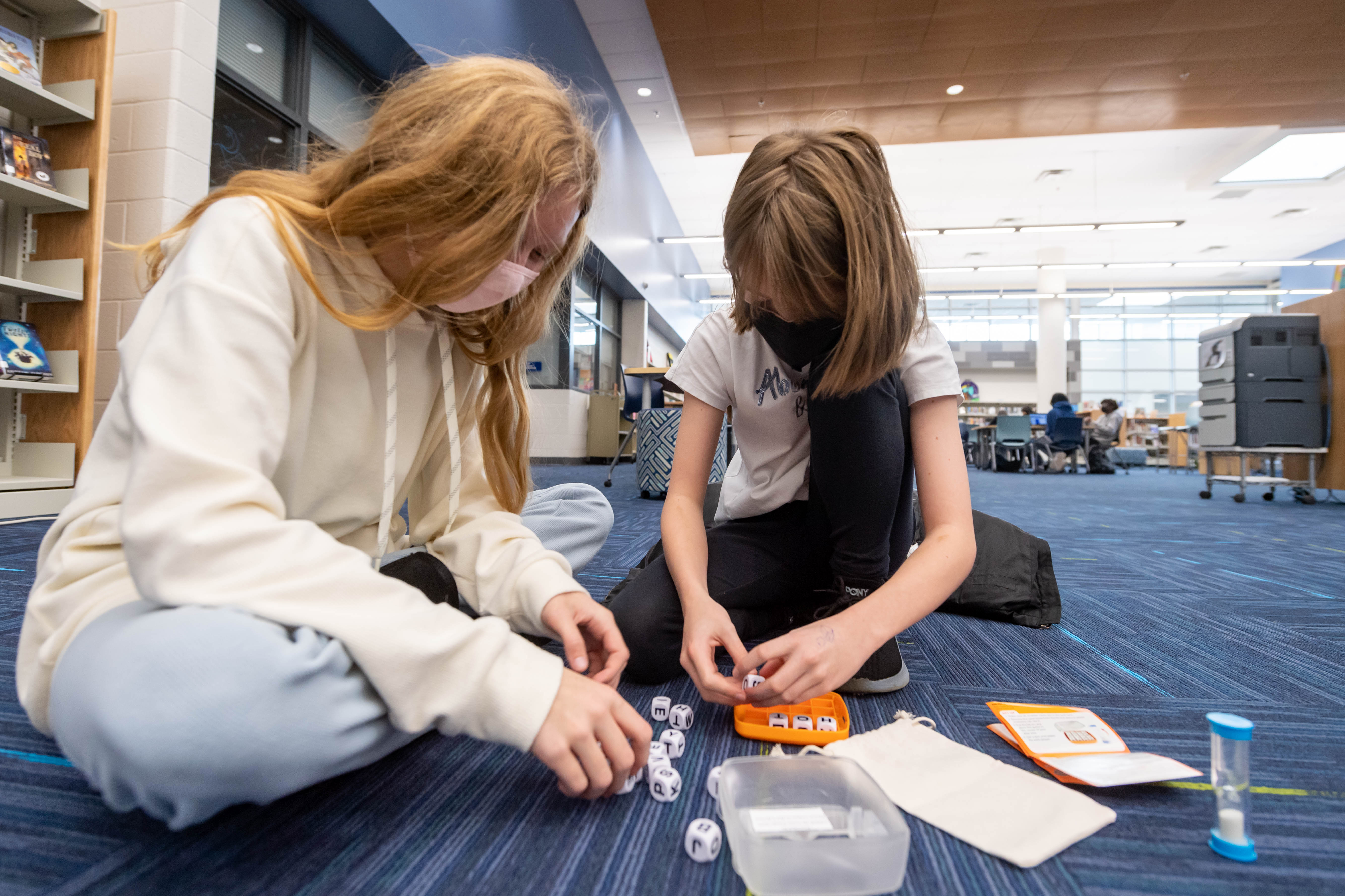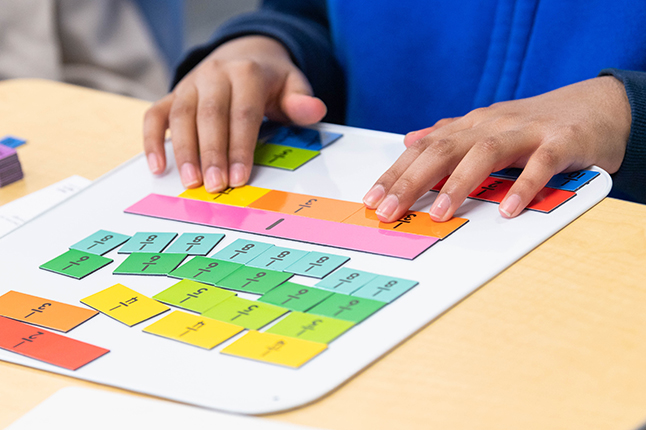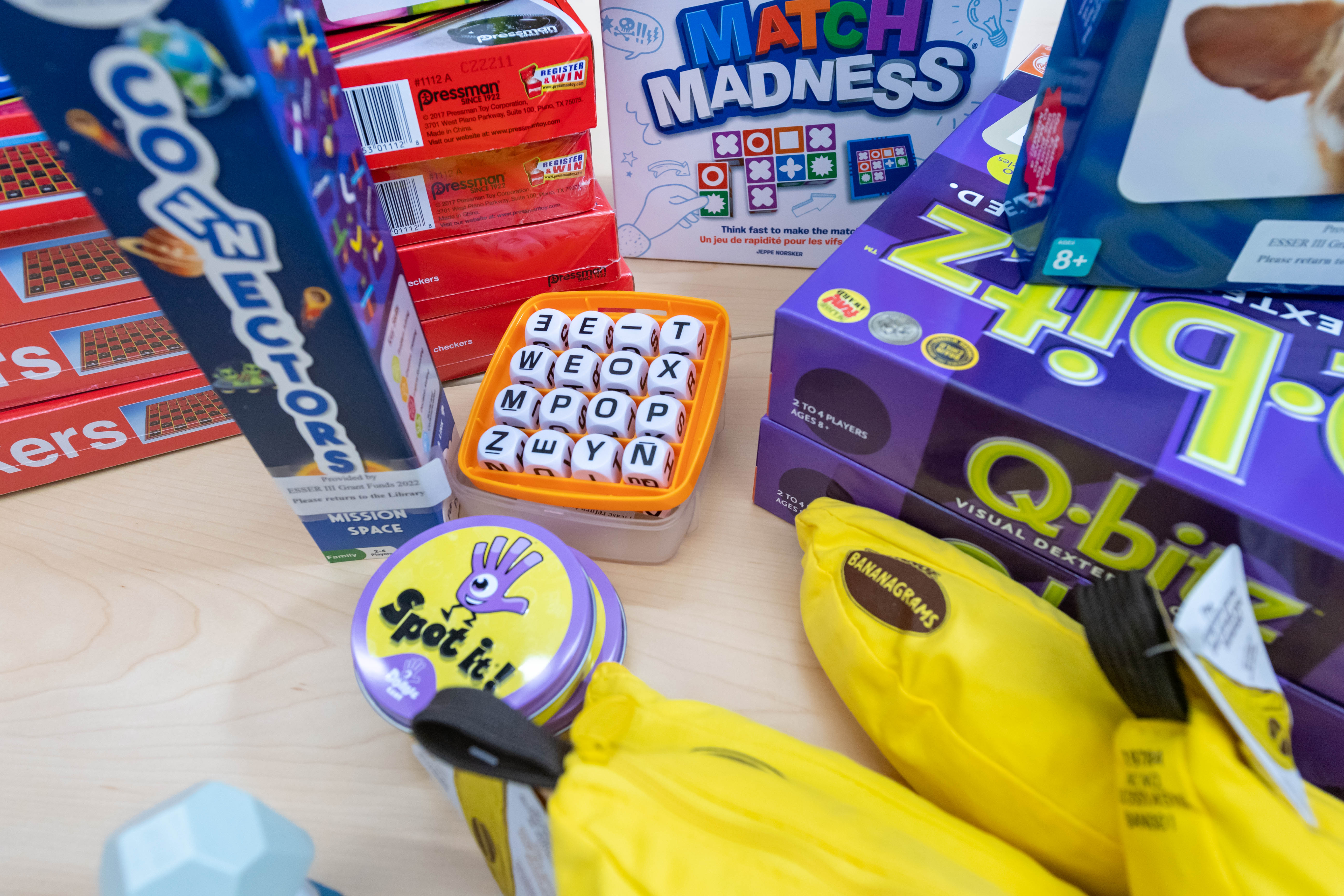Board Games, Backpacks and Boosting Academics: Rocky Run Middle School Taps Pandemic Funds to Assist All Students
In the library at Rocky Run Middle School in Chantilly, some students are playing new board games designed to boost critical thinking. Down the hall, five students go over how to add fractions, using magnetic fraction tiles to assist them in finding common denominators, an elementary school math standard. Others meet after hours with staff who help them organize their backpacks and binders to boost executive function skills that may have lapsed during the pandemic.
All the students are benefitting from Elementary and Secondary School Emergency Relief aid, or ESSER funding – money given to states by the federal government to help address any pandemic-related issues that may be impacting students. Rocky Run educators reviewed standardized testing data, teacher recommendations and work samples to decide which students to target for services and materials funded by the federal money.
“We extended invitations to students based on data driven identification of their needs, even students enrolled in advanced courses were invited,” Rocky Run’s student support dean, Sandra Meador said of the school’s outreach to students. Seventy students received invitations to small group sessions targeting reading, math or executive functioning, Meador says, of which about 70 percent chose to participate.

“If the data showed and teacher feedback supported that a given student would benefit, we invited them, regardless of the academic programs they’re enrolled in,” Meador said. The funding can be used to compensate staff who run the sessions after school for the additional time they are working, as well as provide supplies for classroom teachers to use during the day or add resources to the school’s library.
Laura Robertson, a Rocky Run math teacher, says money has been used to help her buy things like the fraction tiles, which students can use to visually see the differences in fractions as they are trying to master concepts like adding with different denominators, a skill she says is typically taught in elementary school.
“I wanted them to conceptually see what is happening when they add fractions, to have and hold something in front of them that can show them when an answer doesn’t work,” Robertson said.

Without the funding, Robertson says she would have had to make fraction tiles herself by hand for each child, which could take hours and pull her away from her other duties, like meeting with students, responding to parent emails or lesson planning.
“I would have had to draw all these little rectangles myself, cut them into pieces, and color code them,” Robertson said. “It is such a huge time saver to have them prepared already.”
Other Rocky Run students, roughly half of whom are enrolled in advanced content classes, are being helped by ESSER money that aims to boost executive function skills, such as the planning and organization needed to succeed in middle school courses.
“We noticed a lot of students were struggling with managing time, managing tasks, and managing the workload this year,” Meador explained. “Coming out of COVID and virtual learning, where many students worked from their own bedroom and kept everything piled on a desk next to their bed, it has been difficult for some to balance out preparing materials for school, having to bring them to class and needing to know where everything is.”
Annah, a seventh-grader at Rocky Run, says the executive functioning program has really helped her improve academically. She meets in a small group with a teacher after school once a week, who kicked off the program by helping the students take all their papers and distribute items by subject into one folder to keep things organized.
At the start of each session, the teacher reviews the students’ folders to ensure they are staying on top of the organization plan, and gives rewards like candy or a pass to skip to the front of the lunch line to keep students motivated to continue, Annah says.
“I used to have a lot of late assignments, most of my papers I couldn’t find, but when I started doing the method my teacher taught me, things started turning around,” Annah says. “It helped with time management, and getting better grades and things.”
Rocky Run students who aren’t directly enrolled in the after-school programs also stand a chance to benefit from ESSER funds. Rachel Grover, a Rocky Run librarian, says she seized the opportunity to review the school’s collection of books.

“We took some time to analyze our collection, to make sure especially our nonfiction was really ready for students who may be at a lower level,” Grover said. “During the pandemic, some kids were super readers and some kids were not readers….we really need to meet them where they are. We needed to be sure our library had books that would be appropriate for their level and for their interests in middle school, regardless of where their reading level is.”
Grover was also part of the push to add more board games, like Set and Bananagrams, to the school library collection.
“We wanted to provide cooperative games where students can also brush up on social skills as well as improve their critical thinking,” Grover said. “This was a massive effort to look across reports in academics as well as social-emotional surveys for all the areas where students may have been affected by the pandemic, and do what we can to help.”
